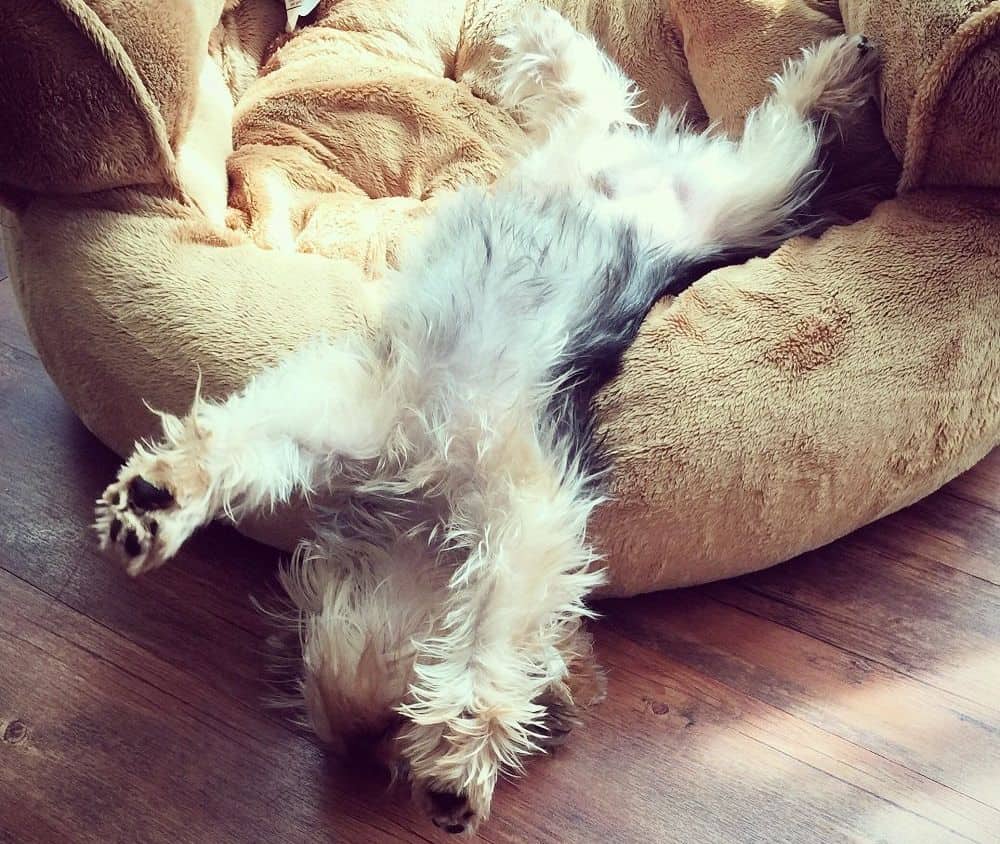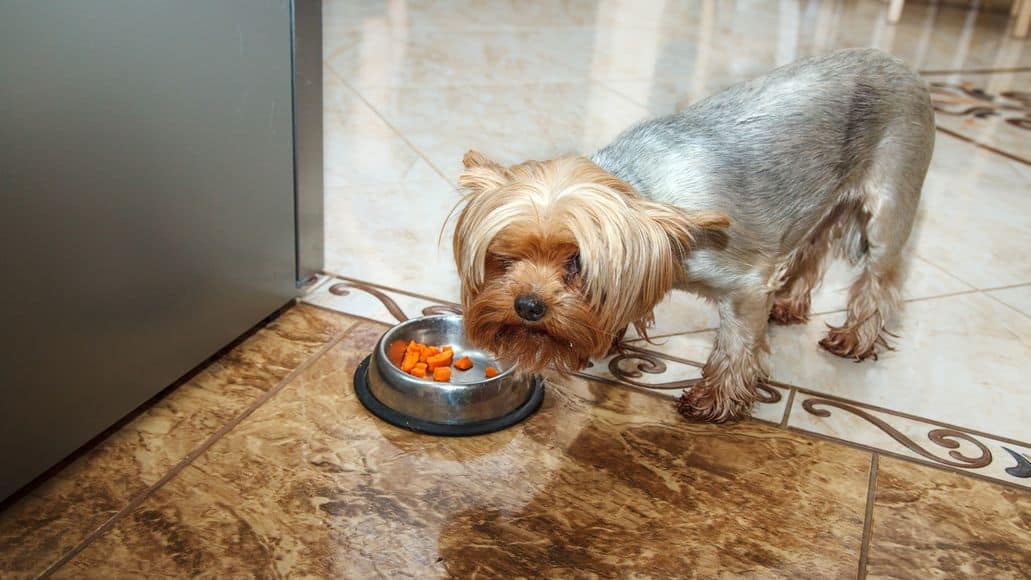
That is part of their charm.
They often do crazy things that make us laugh and fall in love with them even more.
But a Yorkie not acting right can also indicate a serious problem.
If your Yorkie’s behavior changes suddenly, take that as a warning.
There is probably something health-related going on. If you are unable to see what it could be, we strongly recommend taking your dog for a checkup.
But first, keep reading for a rundown of the most common behavioral changes and the underlying issue that could cause them. We will also cover what you should do if your pup is exhibiting any of these changes.
Contents
My Yorkie is Not Acting Right
Is your Yorkie acting strange? That could indicate something is wrong. And often, major changes in behavior can indicate a serious issue.
Sick Yorkies usually show a number behavioral changes. If your Yorkie is sleeping more than usual, not eating, is vomiting, has diarrhea, is showing a change in gait, is urinating more frequently, is exhibiting behavioral changes, or it is having breathing difficulties, then it may be time to call your vet.
10 Changes That Can Indicate Serious Problems

Sickness in Yorkies can take many forms. Sometimes, it may be harmless, but other times, it could be serious. Here are some signs and symptoms to watch for in Yorkies, along with their likely causes and the steps to take.
Lethargy
Healthy Yorkies love to move and play. They are eager to go on walks and will also run to the window to bark at the neighborhood dogs or the backyard squirrels.
If your dog is hiding or sleeping more than usual, and no amount of coaxing can get it to come out, then there is a good chance it could be sick. Several issues can cause lethargy or sleepiness in dogs, including:
- Viral or bacterial infections
- Injuries
- Side effects of medicines
- Deficiencies
- Anemia
- Old age
What To Do
If your Yorkie has suddenly been less active these days, it may be time to visit the vet. Especially if you can’t tell yourself what might be wrong.
Changes In Sleep Behavior

It is normal for Yorkie puppies to sleep for almost 16 to 18 hours a day and for healthy adult Yorkies to sleep around 13 hours, on average.
While sick Yorkies tend to sleep more than usual, their sleep quality might be poor. Your pet won’t be able to sleep deeply due to aches and pains. It might twitch or wake up often. It may pace around and have trouble falling asleep again.
If your pet sleeps in your bed or the same room, you will be able to monitor its sleep. If it sleeps in another part of your house, you could use sleep tracking apps or devices which can show you exactly how much your pet slept.
The following causes can impede sleep in dogs.
- Parasites: both external parasites like fleas or ticks, and internal parasites like roundworms, tapeworms, etc. could cause sleep disturbances in your dog.
- Gastrointestinal issues: these can range from flatulence to food allergies to food poisoning caused by spoiled food. Your Yorkie might suffer from vomiting or diarrhea which could result in disturbed sleep.
- Wounds or fractures: broken bones, injuries, and wounds can cause pain.
- Dental issues: broken teeth, dental cavities, gum disease, etc. could cause sleep issues.
- Arthritis: Yorkies with joint pain often suffer from poor sleep. This type of pain is worse in cold months.
- Fever: dogs cannot sleep if they have a fever. A normal body temperature for Yorkies is 102° to 105° F (38.9° – 40.6° C).
- Diabetes: Unusual sleep patterns can often occur due to a blood sugar imbalance
- Other illnesses: thyroid, heart issues, and kidney disease can all affect sleep patterns.
What To Do
Some issues might resolve in a day or two on their own. If the condition persists over several days, you must see your vet. In addition to a physical exam, vets may order urine and blood tests, X-rays, sonography, etc. to rule out various underlying health issues.
Vomiting

Yorkies may vomit for a variety of reasons.
- After eating grass: this is usually a remedy Yorkies use to clear indigestion.
- Upset stomach: throwing up after eating. Spoilt food, food-borne illnesses, over-eating, food allergies, or eating something toxic can cause this type of vomiting.
- Diseases: infectious diseases, bowel disease, Addison’s disease, certain metabolic diseases, cancer, pancreatitis, etc. can cause severe vomiting in dogs.
- Gastric dilation Volvulus or bloat: although this isn’t common in the Yorkshire Terrier breed, it can be a cause of vomiting after eating. The stomach twists due to gas and food causing pain. Emergency surgery is the only treatment for bloat.
- Kidney or liver failure: both can also result in severe vomiting.
What To Do
If the vomiting persists, your dog is unable to eat or sleep, or if there is blood in the vomit, then see your vet right away.
Diarrhea
Yorkies with runny, watery poop have diarrhea. Your dog might have several bowel movements every few hours. Common causes include:
- Bacterial or viral infection
- Parasites
- Stress
- Spoiled food or food poisoning
- Food allergies/sensitivity, or intolerance
- Disease and certain medicines
- Overeating
What To Do
Sometimes, your dog might self-regulate. Let the toxins pass so your Yorkie can spring back to normal. Mash up some pumpkin puree and add it to your dog’s food.
According to AKC experts, pumpkin regulates a dog’s bowel movements. It can help prevent diarrhea and constipation as well. If symptoms persist or worsen, see your vet.
Not Eating

Most Yorkies eat less in warmer months. This is quite normal. Also, Yorkies may eat less as they age. They do not need as many calories as they grow older.
However, if your food-loving Yorkie suddenly stops eating and shows a general lack of appetite, then it could be a sign of sickness. Causes of a loss of appetite include:
- Infections
- Disease
- Pain
- Liver or kidney issues
- Dental issues
- Cancer
What To Do
Feed your dog bland food such as chicken and rice, bone broth, etc. (but make sure you do not give your Yorkie chicken bones!). If your Yorkie has not eaten for more than two days, please see your vet. With puppies, see a vet much sooner. How long can a yorkie puppy go without eating? Not even a day.
Changes In Urination
If your Yorkie is peeing too often or too little, that could also indicate an illness. Urinary tract infection, diabetes, or other ailments could cause changes in urination in dogs.
What To Do
Please discuss any urination changes in your Yorkie with your vet. See the vet immediately if there is blood in your dog’s urine.
Breathing Changes

These can range from wheezing to shortness of breath to gagging. It may or may not be accompanied by coughing. Causes of breathing issues in Yorkies include respiratory infections, influenza, heart-related issues, or heartworms.
What To Do
- Observe your dog for a day or two. If it appears to be struggling to breathe, see your vet immediately.
Behavioral Changes
Changes in personality and temperament, especially signs of aggression, biting, growling, hiding, or showing protectiveness towards a body part, could indicate illness. Your Yorkie might be in pain. A broken bone, injuries, infections, etc. could be the cause.
What To Do
See your vet right away.
Changes In Gait Or Trouble Walking
If a Yorkie has hip dysplasia, arthritis, a fracture, or other joint-related issues, it might limp, or hop, or exhibit other problems with its hind legs. Your dog might also be reluctant to exercise, run, etc.
What To Do
When my Yorkie is walking weird, I usually allow it to rest for a day or two. If the strange gait persists, see your vet. It could be a serious issue.
Itching, Gnawing, Chewing, Biting
If your Yorkie is constantly chewing or biting itself or its paws, it could be due to external parasites or food or environmental allergies. Hormonal issues may also be a cause.
What To Do
If your Yorkie has hair loss, rashes, oozing skin, blisters, abnormal odor, etc. please see your vet.
Common Diseases in Yorkies: Symptoms and Treatment
Here is a table showing some other common illnesses in Yorkies along their symptoms and with steps you can take to treat them.
| Illness | Symptoms | Treatment |
|---|---|---|
| Ear Infections | Shaking the head, pawing ears, scratching, oozing ear, odor from the ear | Antibiotics or antifungal medicine |
| Cancer | Lumps, bumps, bloody diarrhea or vomit, lack of appetite, behavioral changes, lethargy | Chemotherapy, surgery, natural or alternative remedies |
| Diabetes | Frequent urination, increased thirst, lethargy, appetite changes | Dietary changes, insulin |
| Obesity | Excess weight around ribs, difficulty walking, lethargy | Portion control, dietary changes, exercise |
| Heat Stroke | Panting, drooling, lethargy, increased heart rate, pale gums, vomiting | Cooling, hydration, emergency IV fluids |
| Giardia | Diarrhea, vomiting, weight loss | Antibiotics |
| Ringworm | Lesions on the skin, itching, dandruff, hair loss | Medicated shampoos, anti-fungal medicines (topical and oral) |
Yorkie Not Acting Right: Final Thoughts
People often find it difficult to distinguish between standard odd Yorkie behavior and worrying behavior. That is why we get a lot of questions that begin with “My Yorkie is not acting right….”
But you can generally tell the difference pretty easily. If your Yorkie is just being weird, that’s pretty normal. But if there is a sudden change in a specific behavior, like the ones listed above, there is a good change your pup is suffering somehow. If you can’t tell how, we strongly recommend seeing a vet, just to be safe.
Leave a Reply